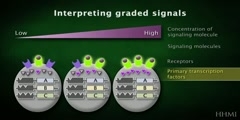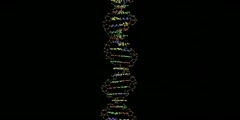Lec 7 - The Importance of Development in Evolution
"Lec 7 - The Importance of Development in Evolution" Principles of Evolution, Ecology and Behavior (EEB 122) Development is responsible for the complexity of multicellular organisms. It helps to map the genotype into the phenotype expressed by the organism. Development is responsible for ancient patterns among related organisms, and many structures important to development shared by many life forms have changed little over hundreds of millions of years. Development is expressed combinatorially, allowing a relatively small amount of genetic information to be expressed in many different ways. 00:00 - Chapter 1. Introduction 03:17 - Chapter 2. Structures of Development 11:04 - Chapter 3. Development and the Diversity of Life 20:21 - Chapter 4. The Control of Development 25:09 - Chapter 5. "Boxes" (Transcription Factors) 38:42 - Chapter 6. The Big Picture and Conclusion Complete course materials are available at the Open Yale Courses website: http://open.yale.edu/courses This course was recorded in Spring 2009.
Video is embedded from external source so embedding is not available.
Video is embedded from external source so download is not available.
Channels: Ecology
Tags: development evolution multicellularity genotype-phenotype map cell differentiation canalization constraint genetics phylogenetics signaling transcription factors combinatorial logic homeoboxes boxes HOX
Uploaded by: yaleevoeco ( Send Message ) on 02-09-2012.
Duration: 45m 51s
Here is the next lecture for this course
What Can Embryos Tell Us About Evolution?
03:44 | 23073 viewsT Cell Development Animation
02:41 | 20189 viewsT Cell Development
02:41 | 9421 viewsLec 4 - Neutral Evolution: Genetic Drift
44:03 | 3593 viewsDoes genetics help understanding evolutio ...
03:43 | 8269 viewsWhat embryos tell about evolution
03:43 | 7199 viewsVirology/Tumor Viruses Lecture MIT
50:21 | 17357 viewsModern genetics confirms darwin theory o ...
05:28 | 7726 viewsT Cell Transcription Factors activation
01:39 | 6424 viewsDevelopment of egg cells
01:27 | 65894 viewsHow Evolution REALLY Works, Part I
00:00 | 12963 viewsHuman evolution: interview with Ian Tatte ...
01:57 | 9931 viewsThe effect of signal molecules on transcr ...
02:04 | 13463 viewsDevelopment of a fetus: a mysterious journey
00:21 | 11627 viewsFacts Of Evolution-The Molecules Of Life
03:52 | 8328 viewsNo content is added to this lecture.
This video is a part of a lecture series from of Yale
Lecture list for this course
Lec 1 - The Nature of Evolution: Selection, Inheritance, and History
Lec 2 - Basic Transmission Genetics
Lec 3 - Adaptive Evolution: Natural Selection
Lec 4 - Neutral Evolution: Genetic Drift
Lec 5 - How Selection Changes the Genetic Composition of Population
Lec 6 - The Origin and Maintenance of Genetic Variation
Lec 8 - The Expression of Variation: Reaction Norms
Lec 11 - Life History Evolution
Lec 14 - Species and Speciation
Lec 15 - Phylogeny and Systematics
Lec 16 - Comparative Methods: Trees, Maps, and Traits
Lec 17 - Key Events in Evolution
Lec 18 - Major Events in the Geological Theatre
Lec 19 - The Fossil Record and Life's History
Lec 21 - Evolutionary Medicine
Lec 22 - The Impact of Evolutionary Thought on the Social Sciences
Lec 24 - Climate and the Distribution of Life on Earth
Lec 25 - Interactions with the Physical Environment
Lec 26 - Population Growth: Density Effects
Lec 27 - Interspecific Competition
Lec 28 - Ecological Communities
Lec 29 - Island Biogeography and Invasive Species
Lec 30 - Energy and Matter in Ecosystems
Lec 31 - Why So Many Species? The Factors Affecting Biodiversity
Lec 32 - Economic Decisions for the Foraging Individual
Lec 33 - Evolutionary Game Theory: Fighting and Contests
Lec 34 - Mating Systems and Parental Care
















